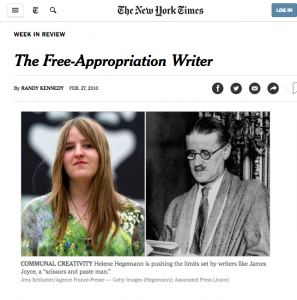Helene Hegemann’s 2010 debut novel, Axolotl Roadkill, is about a troubled 16-year-old girl, Mifti, who has been living by herself in the grime and creative confusion of Berlin since the death of her mother. “What sets Mifti apart is her hypersensitivity and her open, questioning curiosity about an older generation that doesn’t seem to be able to care for its children” (Amazon).
On the surface, this seems like a typical novel, however, it includes entire chunks of writing taken from other books and blogs. Specifically, Hegemann copied passages from a the lesser-known novel Strobo, written by a fellow German author under the pen name of Airen. These copied sections were not words or phrases, but entire paragraphs and in one case, “an entire page was lifted with few changes” (Kulish). Hegemann also pulled from Airen’s blog, such as with one character, Edmond’s, statement: “Berlin is here to mix everything with everything” (Kulish).
When confronted, Hegemann insisted that plagiarism was not her goal, but mixing. “A child of a media-saturated generation, she presented herself as a writer whose birthright is the remix, the use of anything at hand she feels suits her purposes” (Kennedy).
In “Reframing Remix Rhetorically”, Dustin Edwards defines remix as “explicitly build[ing] upon or repurpos[ing] already existing material” (Edwards 42). Specifically, Hegemann’s novel is an example of assemblage remix. It builds an argument by compiling a number of existing texts (interspersed with Hegemann’s own work as well) and pulling all these disparate sources together into a coherent narrative to reveal hidden, recurrent themes of mixing and Germany’s shifting creative climate (Edwards 47-48).
Interestingly enough, Hegemann speaks to such appropriation within the novel, perhaps drawing a (albiet fuzzy) line between her remix and plain-old plagiarism. For example, when another character asks if Edmond came up with that line himself, Edmond replies, “I help myself everywhere I find inspiration” (Kulish). This seems to imply that the line was appropriated, both by the character and by the author. Hegemann is demonstrating that in real life, we pull inspiration, ideas, and yes, even entire quotes from other writers and intellectuals. We steal all the time. So why is it illegal to represent this part of reality in literature?

Similar to Vivian Okkerse’s example of YouTuber Daniel Kim, where Kim had to stop posting his music mixes after copyright warnings from YouTube and SoundCloud, Hegemann’s new art form was attacked by the literary community elite for choosing to build on works that were still under copyright and for not citing her sources. After all, traditional copyright laws have protected the author’s “expression” of an idea, though the ideas themselves were not new (Kennedy). Hegemann wished to comment, critique, and build upon Berlin’s ‘mix everything with everything’ culture. But by not citing sources, she failed to create that conversation between texts and instead began a plagiarism media storm.
However, the interesting affordance of print publishing is that it’s much harder to do take-backs. Hegemann may find some trouble as she continues her career and tries to publish other books, but at least her first novel is out and cannot be taken back. Unlike digital platforms, print platforms afford experimenting remix authors with assured exposure. Works can be halted, but they cannot be taken back.
As media and content producers, remix equips us to contribute to and enter into political debates, make arguments and effect social change, and (perhaps most importantly) provides a “theoretical frame to view culture, authorship, and intellectual property” (Edwards 42).
Word Count: 581
Works Cited:
Edwards, Dustin W. “Framing Remix Rhetorically: Toward a Typology of Transformative Work.” Computers and Composition 39 (2016): 41-54. 24 Dec. 2015, https://drive.google.com/file/d/1R14bK4dhIzjJxcf7UncUB9qq2EveaMLX/view.
Kennedy, Randy. “The Free-Appropriation Writer.” The New York Times, 27 Feb. 2010, www.nytimes.com/2010/02/28/weekinreview/28kennedy.html.
Kulish, Nicholas. “Author, 17, Says It’s ‘Mixing,’ Not Plagiarism.” The New York Times, 11 Feb. 2010, www.nytimes.com/2010/02/12/world/europe/12germany.html.
